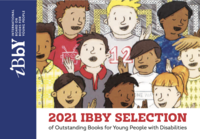International Youth Literature Collection
- The International Youth Literature Collection
- What's So Funny? April 1, 2022
- IYL Launch Event
- Current Events
- International Children's Book Day
- Awards, Prizes and Lists
- International Literature Collections
- Publishers
- International Literature Organizations
- Picture Book Read Alouds
- Silent Books
- Resources for Youth with Disabilities
- Manga Resources
- Books for the World's Children
- The Art of Translation
- International Events
- Resources
- UN 17 Goals to Transform Our World
- Bilingual Book Projects
- 3rd Annual International Children's Book Day Celebration, April 7, 2023
- 3rd Annual International Children's Book Day Celebration, April 7, 2023
Disabilities in Children's Literature

It is important for children to see themselves respectfully and accurately represented in literature. Unfortunately, children with disabilities are vastly underrepresented and oftentimes misrepresented in literature. This page is dedicated to helping people find quality literature featuring children with disabilities. It includes organizations dedicated to promoting quality literature for and about children with disabilities, articles discussing disabilities in literature, and resources you can use to learn how to identify quality literature that respectfully and accurately reflects the nature of the disability.
Disabilities in Literature Toolkit
Organizations

The IRIS Center is a national center dedicated to improving education outcomes for all children, especially those with disabilities birth through age twenty-one, through the use of effective evidence-based practices and interventions. Find tools for college teacher preparation programs and professional development tools for practicing professionals.

DisabilityinKidLit a nonprofit organization dedicated to discussing the portrayal of disability in middle grade and young adult literature. They publish articles, reviews, interviews, and discussions examining this topic from various angles including the disabled community. It is also a place where people from the disabled community can come to discuss books.

The IBBY Collection for Young People with Disabilities is located at Toronto's North York Central Library and includes:
- Outstanding examples of books for and about young people with disabilities
- 4,000 titles in over 40 languages
- Specialized formats such as Braille, PCS and Sign Language
- Tactile and textile books
Disability Visibility Project is an online community dedicated to creating, sharing, and amplifying disability media and culture. Here you will find original essays, reports, book reviews, and blog posts about ableism, intersectionality, culture, media, and politics from the perspective of disabled people.
Project Enable is an organization dedicated to providing online professional development about meeting the library and information needs of preK-grade 12 students with disabilities.

The Section for Library Services to People with Special Needs, a division of the International Federation of Library Associations and Institutions, provides an international forum for the discussion of ideas, sharing of experiences and development of tools designed to promote and improve the effectiveness of library and information services to special needs groups.
Aricles
How to Critically Select Children's Books with Disabled Characters
How to Critically Select Literature with Disabled Characters
Disability labels have long held a negative stigma throughout our society. These negative stigmas bring with them exclusion and the tendency to group all individuals with disabilities in the same category. However, it is important that all types of disabilities are represented in literature. It is empowering for a child to see themselves reflected in literature when they have oftentimes been ignored, stereotyped, or misrepresented. It is just as important to ensure non-disabled children are seeing accurate reflections of disabled people so we can move towards a society that does not ostracize and pity disabled people, but rather one that sees them as the individuals they are. Here is a short list of some guiding principles to consider when you are searching for quality children’s literature featuring disabled characters:
-
Does the character have agency or are they just responsive to the plot/environment they are put in? Choose books where the main character interacts with their environment, for example a character that experiences perseverance in light of difficult situations.
-
Is the character multidimensional or is the only characteristic they have about the disability? It is important that disabled characters are seen as more than their disability.
-
Is the perspective from the disabled person or from an outside perspective? There are currently a lot of books written from an outside perspective. Instead, choose books that tell the disabled person’s story from their point of view.
-
Is the character portrayed as independent, equal, and socially active? Many times children’s books portray disabled people as people who need to be cared for. This is dehumanizing and flattens the disabled experience because it suggests their only role is to require help from those around them. Choose books where disabled characters have meaningful relationships and interact with their environment.
While this list is not meant to be exhaustive, it does act as a good starting point for your selection process. The best way to stay informed is to read and explore! Below this box you will find a 'Toolbox' to help build your knowledge about disabilities so you can make informed decisions when critically selecting children’s literature for and about children with disabilities.
- Last Updated: Feb 23, 2024 12:47 PM
- URL: https://libguides.rutgers.edu/IYLC
- Print Page


